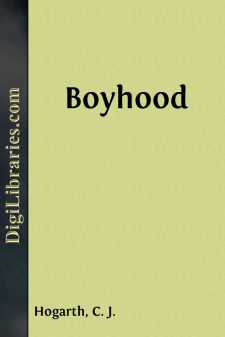Categories
- Antiques & Collectibles 13
- Architecture 36
- Art 48
- Bibles 22
- Biography & Autobiography 815
- Body, Mind & Spirit 144
- Business & Economics 28
- Children's Books 18
- Children's Fiction 14
- Computers 4
- Cooking 94
- Crafts & Hobbies 4
- Drama 346
- Education 58
- Family & Relationships 59
- Fiction 11833
- Games 19
- Gardening 17
- Health & Fitness 34
- History 1378
- House & Home 1
- Humor 147
- Juvenile Fiction 1873
- Juvenile Nonfiction 202
- Language Arts & Disciplines 89
- Law 16
- Literary Collections 686
- Literary Criticism 179
- Mathematics 13
- Medical 41
- Music 40
- Nature 179
- Non-Classifiable 1768
- Performing Arts 7
- Periodicals 1453
- Philosophy 65
- Photography 2
- Poetry 896
- Political Science 203
- Psychology 44
- Reference 154
- Religion 515
- Science 126
- Self-Help 85
- Social Science 82
- Sports & Recreation 34
- Study Aids 3
- Technology & Engineering 59
- Transportation 23
- Travel 463
- True Crime 29
C. J. Hogarth
C. J. Hogarth (1869–1945) was a British writer and translator known for his contributions to English translations of Russian literature. He is particularly noted for translating works by authors such as Leo Tolstoy and Fyodor Dostoevsky. His translation of Tolstoy's "The Cossacks" helped bring the author's writing to a wider English-speaking audience. Hogarth was also a scholar of Russian culture, contributing significantly to the early 20th-century understanding of Russian literature in the West.
Author's Books:
Sort by:
by:
C. J. Hogarth
I — THE TUTOR, KARL IVANITCH On the 12th of August, 18— (just three days after my tenth birthday, when I had been given such wonderful presents), I was awakened at seven o'clock in the morning by Karl Ivanitch slapping the wall close to my head with a fly-flap made of sugar paper and a stick. He did this so roughly that he hit the image of my patron saint suspended to the oaken back of my bed,...
more...
by:
C. J. Hogarth
I. A SLOW JOURNEY Again two carriages stood at the front door of the house at Petrovskoe. In one of them sat Mimi, the two girls, and their maid, with the bailiff, Jakoff, on the box, while in the other—a britchka—sat Woloda, myself, and our servant Vassili. Papa, who was to follow us to Moscow in a few days, was standing bareheaded on the entrance-steps. He made the sign of the cross at the...
more...
by:
C. J. Hogarth
I. WHAT I CONSIDER TO HAVE BEEN THE BEGINNING OF MY YOUTH I have said that my friendship with Dimitri opened up for me a new view of my life and of its aim and relations. The essence of that view lay in the conviction that the destiny of man is to strive for moral improvement, and that such improvement is at once easy, possible, and lasting. Hitherto, however, I had found pleasure only in the new ideas...
more...




